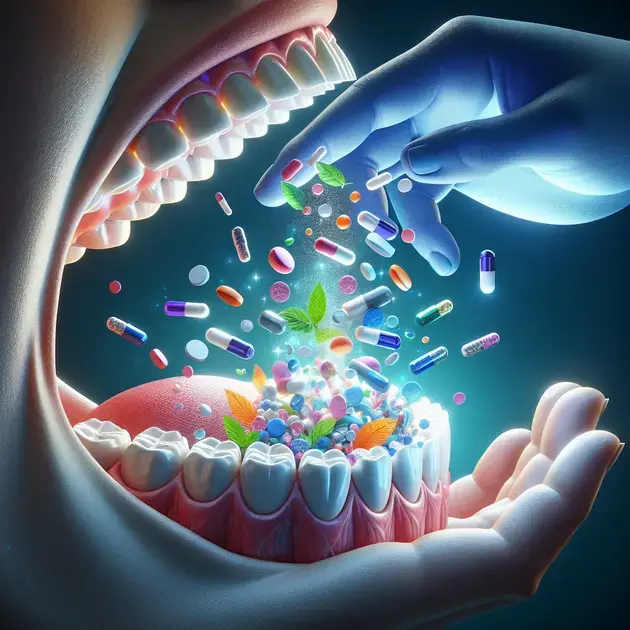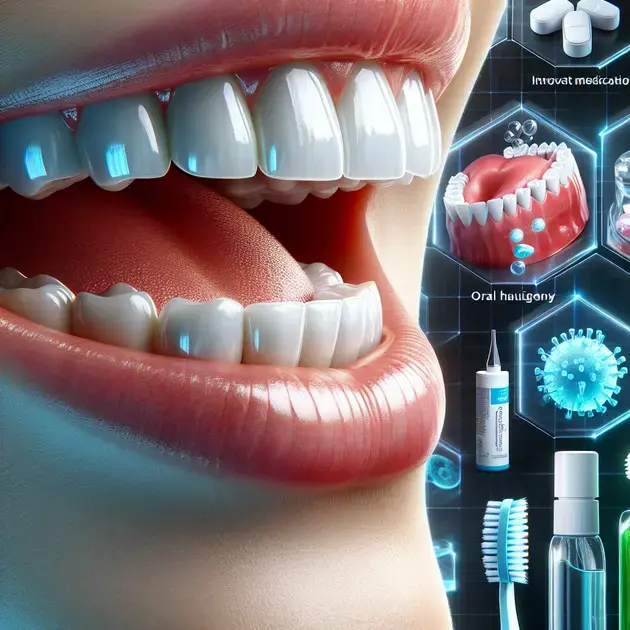When it comes to combating periodontitis, finding the right medication is crucial for effective treatment. In this comprehensive guide, we will explore the most up-to-date and proven options available to manage this common gum disease.
Periodontitis can lead to serious oral health issues if left untreated, making it essential to choose the most effective medication. Let’s delve into the various treatment methods and medications that have shown promising results in combating periodontitis.

Choosing the Right Medication for Periodontitis
Choosing the right medication for periodontitis is crucial for effectively treating this condition. It is important to consult with a healthcare professional, such as a dentist or periodontist, to determine the most suitable medication for your specific situation. One common medication prescribed for periodontitis is antibiotics, which can help reduce the infection and inflammation in the gums. These antibiotics may be in the form of pills or mouth rinses, and the dosage will depend on the severity of the condition.
Another type of medication that may be recommended is antimicrobial mouthwash. This mouthwash can help reduce the levels of bacteria in the mouth, which can contribute to gum disease. Using the mouthwash as directed can help improve gum health and prevent further progression of periodontitis. It is important to follow the instructions provided by the healthcare professional and use the medication consistently for the best results.
In addition to antibiotics and antimicrobial mouthwash, your healthcare provider may also recommend certain over-the-counter medications, such as pain relievers, to help manage any discomfort or pain associated with periodontitis. These medications can help alleviate symptoms and improve your overall comfort while undergoing treatment for gum disease. Make sure to inform your healthcare provider of any allergies or other medications you are taking to avoid any potential interactions.
When choosing the right medication for periodontitis, it is essential to follow the prescribed treatment plan carefully. This may include regular dental visits for cleanings and check-ups, as well as maintaining good oral hygiene practices at home. By following the recommended treatment regimen and taking the prescribed medication as directed, you can effectively manage and improve the symptoms of periodontitis.
Understanding the Importance of Effective Treatment
Understanding the importance of effective treatment for periodontitis is key to preventing further damage to the gums and teeth. Periodontitis is a serious condition that can lead to tooth loss if left untreated, making it crucial to seek prompt and appropriate treatment. Effective treatment can help reduce inflammation, infection, and other symptoms associated with gum disease, improving overall oral health and quality of life.
One of the primary goals of treatment for periodontitis is to control the infection and prevent it from progressing further. This may involve a combination of professional dental cleanings, scaling and root planing procedures, and medication to help manage the infection. Your healthcare provider will work with you to develop a personalized treatment plan that addresses your specific needs and goals.
Effective treatment for periodontitis also involves maintaining good oral hygiene practices at home. This includes brushing and flossing regularly, using antimicrobial mouthwash as recommended, and avoiding risk factors such as smoking. By following these recommendations and staying committed to your treatment plan, you can support the healing process and prevent the recurrence of gum disease.
Regular follow-up appointments with your healthcare provider are essential to monitor your progress and make any necessary adjustments to your treatment plan. These appointments allow your dentist or periodontist to assess the health of your gums, track changes in your condition, and address any concerns or questions you may have. By staying engaged and proactive in your treatment, you can achieve optimal outcomes and maintain a healthy smile.
Exploring Promising Medications for Periodontitis
Exploring promising medications for periodontitis involves staying informed about the latest developments in dental care and treatment options. Researchers are constantly investigating new medications and therapies to improve outcomes for individuals with gum disease, offering hope for more effective and efficient treatments in the future. Clinical trials and studies are ongoing to evaluate the safety and efficacy of new medications for periodontitis.
One promising medication that is currently being researched is a topical gel containing antimicrobial agents. This gel is designed to be applied directly to the gums and can help reduce bacteria levels and inflammation in the periodontal tissues. Clinical trials have shown promising results in terms of improving gum health and reducing symptoms of periodontitis, indicating the potential for this medication to become a valuable treatment option in the future.
Another area of exploration in medication development for periodontitis is the use of probiotics to promote oral health. Probiotics are beneficial bacteria that can help maintain a healthy balance of microorganisms in the mouth, reducing the risk of gum disease and other oral health problems. Incorporating probiotic supplements or foods into your daily routine may offer additional support for gum health and overall wellness.
As new medications and treatment options continue to emerge, it is important to consult with your healthcare provider to stay informed about the latest advancements in periodontal care. By exploring promising medications and therapies for periodontitis, you can proactively manage your condition and work towards achieving optimal oral health outcomes. Remember to discuss any new treatment options with your dentist or periodontist to ensure they are compatible with your individual needs and treatment plan.

Choosing the Right Medication for Gum Health
When it comes to selecting the appropriate medication for gum health, it’s crucial to consider the specific issues you are experiencing. Whether you are dealing with gingivitis, periodontitis, or other gum-related conditions, choosing the right medication is essential for effective treatment. Consult with your dentist or healthcare provider to determine the best course of action based on your individual needs.
There are various medications available for gum health, including antimicrobial mouthwashes, prescription antibiotics, and medicated toothpaste. Each of these options targets different aspects of gum health, so it’s important to understand how they work and which one is most suitable for your condition. Your healthcare provider can recommend the most appropriate medication based on the severity of your gum disease and your overall oral health.
In some cases, a combination of medications may be recommended to address multiple issues simultaneously. For example, using an antimicrobial mouthwash in conjunction with a medicated toothpaste can provide comprehensive care for your gums. It’s important to follow your healthcare provider’s instructions carefully when using multiple medications to ensure their effectiveness and minimize any potential side effects.
Regular dental check-ups are essential when using medication for gum health. Your dentist can monitor your progress, make any necessary adjustments to your treatment plan, and ensure that your gums are responding positively to the medication. By keeping up with your appointments and following your dentist’s advice, you can maximize the benefits of your chosen medication and maintain optimal gum health.
Understanding the Impact of Targeted Treatment
Targeted treatment for gum health involves addressing the specific issues that are contributing to your gum disease. By focusing on the underlying causes of your condition, targeted treatment aims to provide more effective and long-lasting results compared to general or generic approaches. Understanding the impact of targeted treatment can help you make informed decisions about your oral health care.
One key advantage of targeted treatment is its personalized nature. Rather than using a one-size-fits-all approach, targeted treatment takes into account your unique oral health needs and tailors the medication to address those specific concerns. This individualized approach can lead to better outcomes and improved overall gum health.
Targeted treatment also allows for a more precise and efficient response to gum disease. By directly targeting the bacteria or inflammation causing the issue, medications can work more effectively in combating the problem at its source. This focused approach minimizes the risk of resistance or tolerance to medication, ensuring that your treatment remains effective over time.
Another benefit of targeted treatment is its potential for reducing the need for invasive interventions. By addressing gum disease proactively with targeted medications, you may be able to avoid more extensive treatments such as surgery or deep cleanings. This can lead to a more comfortable and convenient treatment experience while still achieving significant improvements in your gum health.
Overall, understanding the impact of targeted treatment can empower you to make the best choices for your gum health. By working closely with your healthcare provider to identify the most effective and appropriate medication for your condition, you can take proactive steps towards achieving and maintaining optimal oral health.
Conclusion
Choosing the right medication for gum health is paramount in effectively treating conditions like gingivitis and periodontitis. Consulting with your dentist or healthcare provider to determine the most suitable medication based on your individual needs is crucial. Whether it’s antimicrobial mouthwashes, prescription antibiotics, or medicated toothpaste, understanding how each option targets different aspects of gum health is essential for optimal treatment.
Furthermore, considering a combination of medications might be necessary to address multiple issues simultaneously. By following your healthcare provider’s instructions diligently, you can ensure the effectiveness of the medications and minimize potential side effects. Regular dental check-ups play a vital role in monitoring your progress and adjusting your treatment plan accordingly to maintain optimal gum health.
On the other hand, targeted treatment offers personalized care by addressing the specific causes of your gum disease. This approach tailors the medication to your unique oral health needs, resulting in improved overall gum health and better outcomes. By directly targeting the bacteria or inflammation responsible, medications provide a more precise and efficient response, minimizing the risk of resistance and ensuring long-term effectiveness.
In conclusion, understanding the impact of targeted treatment empowers you to make informed decisions regarding your gum health. Working closely with your healthcare provider to identify the most effective medication for your condition enables you to take proactive steps towards achieving and maintaining optimal oral health. By embracing targeted treatments and personalized care, you can significantly improve your gum health and overall well-being.



